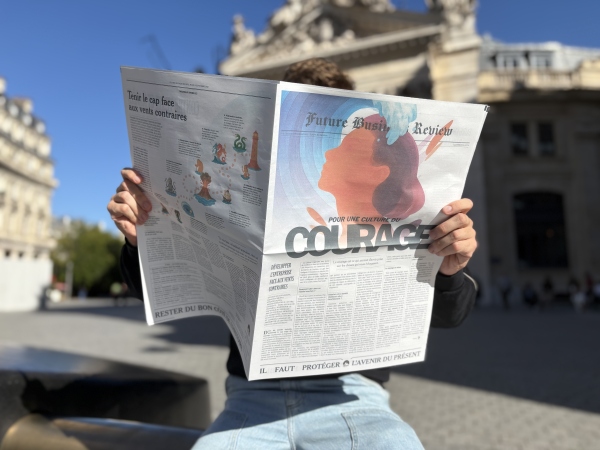The corporation is often perceived as an inanimate object that can be steered by numbers. The accumulation of data gives an organization the impression that it knows itself, knows its market, and makes informed decisions. From SAP to Salesforce, the promise remains the same: quantify everything through data to make it manageable. Anything that doesn't fit into this logic isn't worth dwelling on. As a result, powerful levers like the company's founding myth, its connection to its region, the dynamics of gift-giving and reciprocity in employee engagement, and other intangible assets remain underutilized.
“Being data-driven is the death of art.”
Economist Mariana Mazzucato shows that the frameworks and best practices offered by consultants often encourage companies to prioritize external data over their own analysis. The result: they lose decisional autonomy, allow themselves to be guided by market trends rather than their own intentions, and end up copying one another, becoming commonplace and generic.
Since everyone is using the same tools, data, and mental categories, all the logos start to look the same, offerings cease to be differentiated, and the company's "voice" is no longer recognizable. This prevents it from asserting anything unique or expressing what is most human—and therefore strongest—about it. Consequently, the relationship it builds with its employees and customers becomes depersonalized, and its value decreases.
36% of leaders cite the talent and skills shortage as the #1 barrier to growth (Syntec, 2025), and 72% say that preserving margins is their #1 priority (CCI, 2025). Employee engagement, supplier trust, and the perceived value for consumers are all under threat. To build commitment to the company's vision, business model, and products—and to guarantee its long-term market viability—it has become essential to cultivate this uniqueness.
The Importance of Asserting Your Uniqueness to Resonate with Your Market (and Society)
Before going further, let's take a new look at what we commonly call the "market." More than just a cold, technical object, the market is above all a complex relational system in which actors—companies and customers—interact, are affected by one another, enter into relationships, and mutually transform each other.
To thrive in its market, a company must therefore "enter into resonance" with its stakeholders. This is explained by sociologist Hartmut Rosa, who posits that there are two modes of relating to the world and others: alienation and resonance (Rosa, 2016).
Alienation is the moment when actors lose their ability to express something truly personal, to the point where they have nothing left to exchange. It leads to a sterility in interactions that produces neither value nor growth. A market of alienating relationships is like lukewarm water.
Conversely, resonance is the highest form of relational engagement. It refers to the ability to build lasting, meaningful relationships with all stakeholders, to the point of fueling a system of mutual transformation that enriches everyone. But for this to happen, "resonant relationships presuppose that the subject and the world are sufficiently 'closed,' or consistent"—and therefore unique—"in order to speak with their own voice, and sufficiently 'open' in order to be affected and reached."
Companies "in resonance" with their market are therefore those that embrace their uniqueness while remaining open to others. It is this fertile tension between consistency and openness that allows the company and the market to remain alive: a space where distinct voices can circulate, influence each other, and transform together.
Standing Out in People's Minds More Strongly Than Competitors
The mutual health insurance company Alan is a good example of this type of relationship. Insurance is a commoditized product par excellence, and its consumers are used to choosing a plan by comparing tables of benefits. But to make Alan's voice heard, its founders established strong convictions from the very beginning about their insurance product, the social function of health coverage, and the healthcare experience. Since the end of the COVID pandemic, Alan has positioned itself in mental health with free services like Alan Mind and makes prevention fun with its "berries." They have also designed their company culture as a product to attract the best talent (FBR, January 2025). Both employees and customers choose Alan for these positions—for this unique, different voice. Alan "exists" in our minds more strongly than its competitors.
Anchoring in Your Uniqueness to Weather the Storms of Uncertainty
How can a company "be itself"? It is a process that is as long and fascinating as it is gradual. First, the company must clarify its identity and cultural heritage through a detailed introspective and retrospective analysis: Who are we? What is our history? What makes us different? What made us successful in the past?
Once this horizon is clear, the company must then ensure it brings together the right people capable of embodying both its identity and its affirmed culture.
Finally, it is important to engage the entire organization in collective conversations. A unique proposition is not built alone; it is created within a more or less formal ecosystem. "Meaningful innovation" is found in a company's ability to connect personally with "key interpreters" who make sense of what people do and move beyond mainstream interpretations (Verganti, 2009).
Participating in these conversations is therefore a personal commitment from its leaders. They roll up their sleeves and tell us, "This is what is meaningful, and I want to connect with other people who are wired the same way to develop my intuition." At the end of these conversations, these leaders know what they personally want to give to their stakeholders. These strong convictions structure the company's uniqueness and thus create the framework that will be amplified by future interpretations. This is how a company takes shape: one that asserts strong convictions and maintains an engaged dialogue with society, in which both can touch each other and prosper with confidence.





